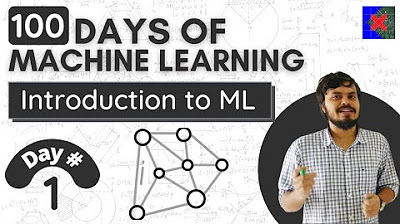ML Engineering is Not What You Think - ML jobs Explained
Summary
TLDRThe video script delves into the complexities and distinctions among various machine learning (ML) job roles, aiming to clarify the confusion surrounding these positions. It outlines the foundational role of data engineering in ML pipelines, emphasizing the importance of data collection, infrastructure, and preprocessing. Data scientists are portrayed as professionals who extract business insights through statistical analysis and predictive modeling, often utilizing automated ML tools. Applied scientists are distinguished by their focus on applying scientific methods to solve real-world problems, requiring cross-disciplinary expertise. ML engineers are described as a specialized form of software engineers, expected to develop and deploy scalable ML applications. The script also touches on the advanced roles of research scientists and engineers, who are at the forefront of developing new ML models and improving existing ones, with research scientists focusing on theoretical advancements and research engineers on practical implementations. The summary concludes by highlighting the blurred lines between these roles and the importance of examining job descriptions for accurate expectations.
Takeaways
- 📈 **Data Engineering**: The foundation of ML pipelines, focusing on building data collection pipelines and managing data flow within an organization.
- 🔍 **Data Scientist**: Analyzes data to extract business insights, using statistical methods and ML algorithms to find patterns and predict outcomes.
- 🧬 **Applied Scientist**: Applies scientific knowledge to solve real-world problems, often working with complex data sets and requiring cross-disciplinary expertise.
- 💻 **ML Engineer**: A subfield of software engineering, focusing on developing and deploying machine learning applications, often with a strong emphasis on software system architecture.
- 🏆 **Research Scientist**: Develops new models and explores domains of ML, committing to a specific domain of expertise and publishing papers on their findings.
- 🛠️ **Research Engineer**: Implements ideas from research scientists, running necessary experiments and contributing to the development of new ML techniques.
- 📚 **Educational Background**: Research scientist roles often require a PhD and/or first-author papers at top-tier conferences, while research engineering roles generally do not.
- 🤝 **Collaboration**: Data scientists work closely with business stakeholders, requiring strong communication skills to present findings to non-technical audiences.
- 📊 **Exploratory Data Analysis (EDA)**: A key part of a data scientist's role, involving manual analysis of data to find patterns and trends that inform business decisions.
- 🚀 **Product Development**: ML Engineers aim to turn data into products, which is a key difference from data scientists who focus on generating business insights.
- 🧳 **Job Title Variability**: The actual job responsibilities can vary greatly even among individuals with the same title, emphasizing the importance of looking at the specific job description.
Q & A
What is the foundational role of a data engineer in machine learning?
-A data engineer is responsible for building data collection pipelines and managing the flow of data within an organization. This includes connecting to data sources, automating data collection, pre-processing data, and warehousing it for accessibility and filtering.
What does exploratory data analysis (EDA) involve for a data scientist?
-Exploratory data analysis (EDA) involves manually analyzing data using statistical methods to find patterns and trends that can inform business decisions. This is a crucial step for data scientists to extract business insights from the data.
How do data scientists typically approach predicting outcomes using machine learning?
-Data scientists often use simple machine learning algorithms for tasks like segmentation or prediction. They may use auto ML tools that automatically train different models to find the best performer. The goal is to apply these models to business problems, such as customer segmentation or fraud detection.
What is the primary focus of an applied scientist in the context of machine learning?
-An applied scientist focuses on applying scientific knowledge and research methods to solve real-world practical problems. They take theoretical research methods and adjust them to work for real-world data sets, often in specific industries like healthcare, requiring cross-disciplinary expertise.
What distinguishes an ML engineer from a data scientist?
-While data scientists aim to generate business insights, ML engineers focus on turning data into products. ML engineering is considered a subfield of software engineering, and ML engineers are expected to be proficient in software engineering tools for developing and deploying machine learning applications.
What are the key responsibilities of an ML engineer?
-ML engineers are expected to develop and deploy machine learning applications using software engineering tools. This can include developing endpoints for ML applications, creating training pipelines, and maintaining complex distributed computing infrastructures for large-scale training.
What is the role of a research scientist in the field of machine learning?
-A research scientist has a solid understanding of machine learning and deep learning. They explore different domains, commit to a specific domain of expertise, read papers, come up with hypotheses, implement ideas, design experiments, and verify their hypotheses. The goal is often to publish papers and present at conferences.
How does the role of a research engineer differ from that of a research scientist?
-A research engineer uses their engineering skills to implement the original ideas conceived by research scientists and set up and run necessary experiments. The boundary between these roles can be blurry, as both contribute to the development and implementation of ideas, but research engineers may not be the primary authors of papers.
Why might there be confusion regarding the job titles in machine learning?
-Job titles can be confusing because they often poorly reflect the actual work done. Two people with the same title may perform different tasks, and those doing similar work might have different titles across companies. The best way to understand a role is to look at the job description in the listing.
What is the importance of communication skills for a data scientist?
-Communication skills are crucial for data scientists as they need to work closely with business stakeholders, understand their goals, and present their findings in an understandable way to non-technical team members and senior staff.
What are some common tasks that an ML engineer might perform that are related to software system architecture?
-An ML engineer might develop endpoints to handle requests for ML applications, ensure scalability, create training pipelines, or develop and maintain a complex distributed computing infrastructure for large-scale training.
How does the role of an applied scientist intersect with that of a researcher?
-The role of an applied scientist intersects with research by applying theoretical research methods to real-world problems. They need to read papers, build on existing research, and make adjustments for real-world data, often requiring expertise in both machine learning and the specific industry they are working in.
Outlines

Cette section est réservée aux utilisateurs payants. Améliorez votre compte pour accéder à cette section.
Améliorer maintenantMindmap

Cette section est réservée aux utilisateurs payants. Améliorez votre compte pour accéder à cette section.
Améliorer maintenantKeywords

Cette section est réservée aux utilisateurs payants. Améliorez votre compte pour accéder à cette section.
Améliorer maintenantHighlights

Cette section est réservée aux utilisateurs payants. Améliorez votre compte pour accéder à cette section.
Améliorer maintenantTranscripts

Cette section est réservée aux utilisateurs payants. Améliorez votre compte pour accéder à cette section.
Améliorer maintenantVoir Plus de Vidéos Connexes

Artificial Intelligence Class 10 Ch 1 |AI vs Machine Learning vs Deep Learning (Differences) 2022-23

How To Do Machine Learning Research Without A PhD

What is Machine Learning? | 100 Days of Machine Learning

Data Science Jobs Explained in 5 Minutes

What is difference between Homeopathic Mother Tincture & dilution ?

AWS re:Invent 2020: Understand ML model predictions & biases with Amazon SageMaker Clarify
5.0 / 5 (0 votes)
